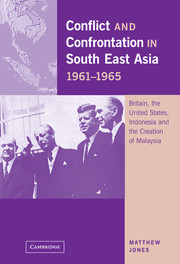 Conflict and Confrontation in South East Asia, 1961–1965
Conflict and Confrontation in South East Asia, 1961–1965 Published online by Cambridge University Press: 25 July 2009
At the beginning of 1963, the British Government received another of the body blows that came to characterize the final years of Macmillan's premiership. With negotiations to admit Britain into the European Economic Community at an advanced stage, de Gaulle convened a press conference on 14 January where he announced in unabashed fashion that he was vetoing British entry. The whole thrust of the government's international policies, formulated in the summer of 1961, had been disposed of in a matter of minutes. ‘It is the end – or at least the temporary bar – to everything for which I have worked for many years’, Macmillan sadly noted in his diary. ‘All our policies at home and abroad are in ruins.’ In parallel with the turn to Europe, the discussions in the Future Policy Committee in 1961 had shown that senior ministers had been thinking of significant reductions in South East Asia commitments. A Laotian settlement (drawing the teeth from plans for SEATO intervention in Indochina) and the creation of Malaysia, allowing the relinquishment of residual colonial responsibilities and a transfer of internal security duties at Singapore to Kuala Lumpur, appeared well on track by the summer of 1962.
The emergence of Indonesian hostility to the plans for Malaysia, however, constituted another setback to the notion of reducing commitments. Indeed, from this period onwards in British overseas policy, there was a tendency to shift attention away from the European stage to a renewed focus on the east of Suez role.
To save this book to your Kindle, first ensure no-reply@cambridge.org is added to your Approved Personal Document E-mail List under your Personal Document Settings on the Manage Your Content and Devices page of your Amazon account. Then enter the ‘name’ part of your Kindle email address below. Find out more about saving to your Kindle.
Note you can select to save to either the @free.kindle.com or @kindle.com variations. ‘@free.kindle.com’ emails are free but can only be saved to your device when it is connected to wi-fi. ‘@kindle.com’ emails can be delivered even when you are not connected to wi-fi, but note that service fees apply.
Find out more about the Kindle Personal Document Service.
To save content items to your account, please confirm that you agree to abide by our usage policies. If this is the first time you use this feature, you will be asked to authorise Cambridge Core to connect with your account. Find out more about saving content to Dropbox.
To save content items to your account, please confirm that you agree to abide by our usage policies. If this is the first time you use this feature, you will be asked to authorise Cambridge Core to connect with your account. Find out more about saving content to Google Drive.